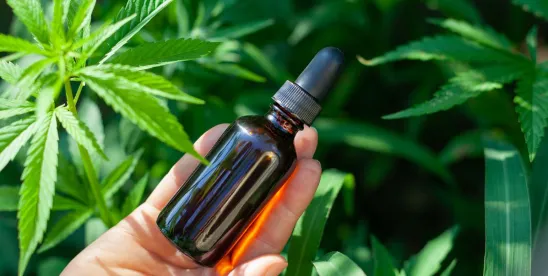You’ve probably seen the reports of the United States Fourth Circuit Court of Appeals’ January 7, 2025 opinion upholding a Virginia law that regulates consumable hemp products. I planned to put up a blog post soon after the opinion was handed down, and I will still summarize the holding here. But the delay in writing allowed me to take a step back (and another step back), and view this in proper perspective: 2025 is going to be a huge year in the state law hemp legislation vs. hemp industry Farm Bill disputes that have been simmering over the last couple of years. Let me explain how this will soon boil over.
If you are still reading this, I suspect I don’t need to provide an overview of the 2018 Farm Bill and its impact on the hemp industry, notably on the consumable hemp product industry. If you want a refresher on that, you can read some of our older articles on the subject here and here. With that backdrop, more and more states have in recent years passed laws restricting the production and sale of consumable hemp products with each passing legislative session. And with each new piece of legislation comes a new legal challenge. Most of these cases start in a federal trial court, and over the last few years, we have seen those courts reach varying decisions although the majority uphold the restrictive state legislation. Appeals have followed, and this year, kicked off by the Fourth Circuit’s January 7 decision, should go a long way towards molding this little pocket of jurisprudence and potentially influencing how the Farm Bill is ultimately modified.
Fourth Circuit Upholds Consumable Hemp Restrictions
As the Fourth Circuit put it in its Northern Virginia Hemp & Agriculture, LLC v. Virginia opinion, Virginia “took action” to address its “marijuana problem” by passing a 2023 law that regulates the retail sale of hemp products based on their total THC level and limits the concentration of that level in products in a more restrictive manner than what was legal under federal law. — F.4th —-, 2025 WL 37238 (4th Cir. 2025). A lawsuit soon followed that sought injunctive relief under the usual constitutional arguments – the Supremacy Clause and Dormant Commerce Clause. The district court rejected the plaintiffs’ arguments, and the Fourth Circuit appeal followed.
Conceptually following the Seventh Circuit’s 2020 C.Y. Wholesale, Inc. v. Holcomb, 965 F.3d 541 (7th Cir. 2020) opinion, the Fourth Circuit affirmed the district court’s dismissal of the suit, detailing why each constitutional challenge failed. As for the Supremacy Clause, the court addressed each applicable preemption doctrine in turn (express, field, and conflict). Rejecting plaintiffs’ express preemption argument, the court concluded that “the plaintiffs’ argument overread” the Farm Bill’s notes stating that a state can’t prohibit the transportation or shipment of hemp or hemp products. Focusing on the Farm Bill’s plain language authorizing states to regulate the production of hemp more stringently than federal law, the court held that the plaintiff’s express preemption argument “crumbles.” And, based on that Farm Bill provision and further due to that law expressly designating states as the “primary regulatory authority over the production of hemp,” the court rejected plaintiffs’ field preemption argument. As for conflict preemption, the court disregarded plaintiffs’ argument that the total THC standard set forth in the Virginia bill conflicted with the Farm Bill’s definition of what constitutes legal hemp, concluding that “[w]hen the actual language of the statutes is considered, S.B. 903 is [neither] in direct conflict with the purpose of the Farm Bill [nor] does it pose an obstacle to its purpose.”
Plaintiffs’ dormant commerce clause faced the same fate. Holding that the Virginia law did not favor in-state entities to the detriment of out-of-state ones, the court noted that the total THC standard applied equally to resident and nonresident entities. The court also found that allegations of cost increases were both speculative and equally applicable to all entities, no matter where domiciled. This decision follows the Seventh Circuit (the only other circuit court addressing these precise challenges) in upholding state laws that regulate hemp products more restrictively than the Farm Bill.
Eighth Circuit Ruling Looms
We have discussed the Bio Gen LLC et al. v. Sanders case before here and here, which now awaits a ruling from the Eighth Circuit. The court heard arguments on September 24, 2024, and the Arkansas attorney general sent the court a letter on January 8 informing it of the Fourth Circuit’s decision. That letter follows a December 3, 2024 letter the AG sent informing the Eighth Circuit of an October 10, 2024 New Jersey federal court decision (Loki Brands, LLCv. Platkin, No. 24-9389, 2024 WL 4457485 (D.N.J. Oct. 10, 2024)) upholding a New Jersey law regulating hemp products in the state, in which the AG noted:
With that decision, one court of appeals [now two after the 2025 Fourth Circuit opinion] and a total of eight district courts spanning five other circuits – in Alaska, California, Hawaii, Iowa, South Dakota, Virginia, Wyoming, and now New Jersey – have rejection [sic] implied preemption challenges to laws like the one at issue here, with the district court below the sole outlier.
Will the Eighth Circuit affirm the lower court’s outlier ruling that sided with the hemp industry plaintiffs and enjoined the Arkansas law, or will the court follow the Fourth and Seventh circuits and reverse? We should have an answer very soon.
10th Circuit Ruling Expected in 2025
After a Wyoming court rejected constitutional challenges to a Wyoming law that prohibited hemp from containing “synthetic substances,” added certain psychoactive isomers to the definition of THC, and added delta-8 to the list of controlled substances, the plaintiff hemp businesses filed suit. Similar to the Fourth Circuit’s ruling discussed above, the U.S. district court in Wyoming concluded that the Farm Bill did not preempt the Wyoming law and that the law did not violate the Dormant Commerce Clause. The court also rejected a regulatory takings argument. The hemp companies appealed that ruling to the 10th Circuit where briefing concluded on January 2, 2025. Like the Arkansas attorney general, Wyoming’s AG informed the 10th Circuit of the Fourth Circuit’s recent opinion. The 10th Circuit case is Green Room, LLC v. Wyoming, Nos. 24-8053 & 24-8054.
Will the Fifth Circuit See a Similar Appeal in 2025?
During the 2024 legislative session, the Louisiana Legislature amended its hemp laws to restrict where certain hemp-derived products can be sold and their potency. The hemp industry quickly responded with litigation. That matter, Hemp Assoc. of La. v. Landry, No. 3:24-cv-00871, in the U.S. District Court for the Middle District of Louisiana, was filed on October 18, 2024. The plaintiffs alleged that the 2018 Farm Bill preempts the legislation and is unconstitutional on other grounds. The state disagreed and moved to dismiss, but on November 19, 2024, the state informed the court that it would stay the effective date of the new legislation so that the parties could fully brief the pending motions and the court could reach a decision. Under a January 8, 2025, order, briefing on defendants’ motion to dismiss the plaintiffs’ challenge to the Louisiana law will conclude on February 10, 2025, and a hearing on the motion is set for March 27, 2025.
What Does this All Mean?
With Congress again extending the reauthorization process for the Farm Bill, the judiciary branch is helping shape the future of the consumable hemp product industry. And, while we may not see any U.S. Circuit Courts of Appeals beyond those discussed above decide these issues in 2025, federal courts in other jurisdictions, including New Jersey, Iowa, and South Dakota, issued notable rulings on these same issues last year. Also, with new legislative sessions just ramping up in states across the country, we expect new state laws that, if history repeats itself at all, will lead to new court challenges that raise the same constitutional challenges that have been and are currently being adjudicated.




 />i
/>i

